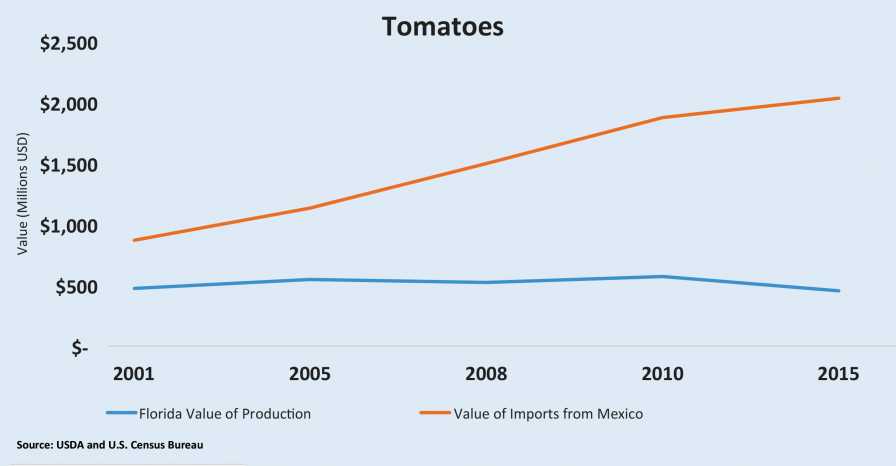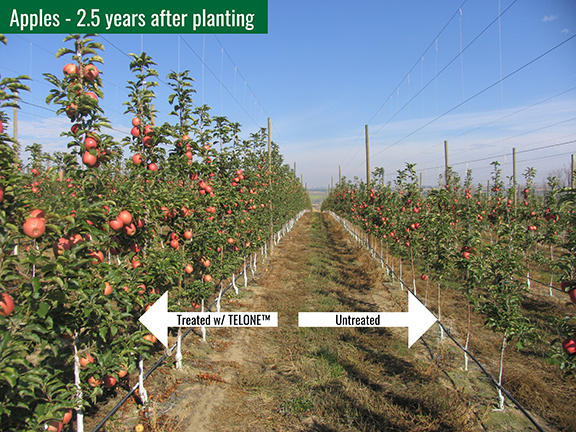Unfair Trade Taking Its Toll on Florida Farmers

It’s easy to see the impact Mexican tomatoes have had on the Florida market in recent years.
The fall/winter growing season was a tough one for Florida’s specialty crop producers, many of whom left crops in the ground because of too much product and prices that fell below the cost of production.
A number of factors for such a “deadly storm” were at play: ideal weather that produced bumper crops, low consumer demand because of cold weather in the Northeast, and significantly increased import surges from Mexico. Phrases like “bloodbath” and “worst season in decades” were common in grower conversations.
The biggest culprit, growers say, is “dirt cheap” produce — particularly tomatoes, peppers, and strawberries — being dumped into the state by Mexico, where production costs are a fraction of what they are in Florida.
“It’s happening all over with the vegetable market in general. There’s not really any demand for anything. Everything is cheap and over-supplied,” Belle Glade grower Rick Roth told the Palm Beach Post in January.
That’s why the grower community is hopeful over President Trump’s announced intention to renegotiate the North American Free Trade Agreement (NAFTA). They see it as an opportunity to right the wrong dealt to the industry when the treaty was negotiated in the early 1990s. The ordeal of Florida farmers since the pact was signed illustrates how poorly crafted trade agreements can hurt an industry.
Down With Dumping
Florida agriculture wants its voice heard as Trump moves forward on trade. To that end, the specialty crop industry is working with the Florida Department of Agriculture and Consumer Services to devise solutions that would end the Mexican dumping and create fairer trade practices.
FFVA President Mike Stuart and a group of agriculture representatives visited the offices of Florida’s congressional delegation in February to push for an end to Mexican dumping of fresh vegetables and fruit into Florida. The lawmakers and their staffs were receptive, Stuart said. Several of the legislators hold positions on several key committees, including House Ways and Means, House Agriculture and Senate Finance.
Navigating NAFTA
Florida’s stance on NAFTA runs counter to many other sectors of agriculture, which have benefited from open trade with Mexico. But it’s our state’s specialty crop industry that has paid the price of other commodities’ access to foreign markets.
In the years immediately after NAFTA’s passage, U.S. trade officials failed to fulfill promises and commitments that were made to secure Florida’s support for the trade pact. Safeguards and remedies that were supposed to protect Florida’s specialty crop industry clearly did not work.
In comments to the House Committee on Agriculture back in 2001, FFVA discussed the dire outcomes for Florida farmers as a result of NAFTA: “Since the NAFTA Agreement took effect, Florida fruit and vegetable growers have lost significant domestic sales to Mexico of tomatoes, bell peppers, cucumbers, and other crops. … Increased investment has substantially advanced Mexico’s technology, increased Mexico’s production in competitive crops, and reduced per-unit costs of those commodities.”
In the 16 years since that testimony, import surges from Mexico have continued to devastate the market for Florida produce. It’s unclear how Trump plans to move forward (at least at this writing). But state officials and industry leaders will continue to strategize on a workable solution for growers.










